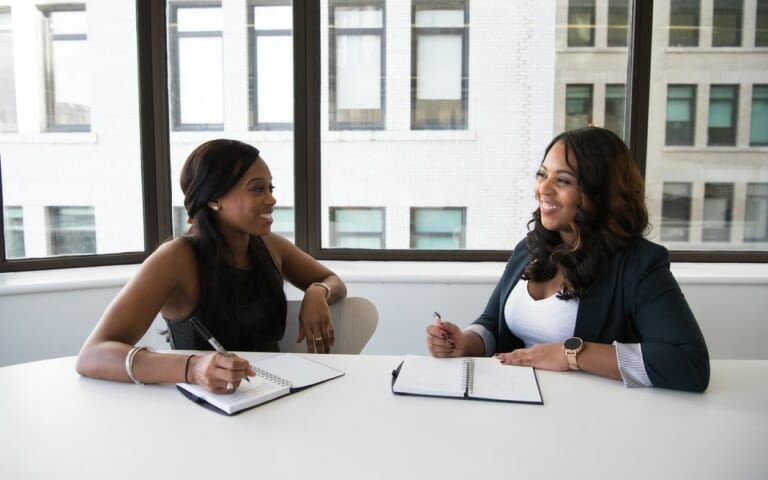
What questions do you have for us? You’ve likely heard this at the end of an interview. That’s because an interview is a two-way street and as a candidate, the question period after an interview is a great time to learn more about workplace culture from actual employees.
With the right questions, you can cut through boilerplate answers and general company goals you may find on their careers site to learn more about your prospective workplace’s culture and understand if it is the right choice for you.
Ideally, these questions relate to what you’re specifically looking for in a work environment, but we know that can be hard to narrow down or articulate. If you’re not sure which questions to ask, don’t worry; we’ve got you covered below with seven questions to ask at the end of an interview to learn about workplace culture.
What makes you proud about working here?
Pride is a precious feeling. It only comes from achieving or contributing to something that you value deeply. This is why asking your interviewer what makes them proud about working for their company is such a helpful question to ask: it uncovers wherever the company is making a meaningful impact in their culture.
Plus, by asking your interviewer’s perspective, you can rely on the answer to be less in “company speak” and more from the perspective of a real employee.
How do people spend their time during lunch?
Lunch is one of the few times throughout the day where employees can spend their time doing exactly what they want. Because of this, by hearing how people spend their time during lunch, you can get an idea of the kinds of personalities you’ll be working with on a human level, as well as the company’s attitude towards free time.
For example, do people often go for walks, cook lunch, go to the gym, or generally step away from their desks? Even in remote workplaces, if people are too swamped to step away from their desks to take a rejuvenating break, that could be a cultural red flag relating to work-life balance.
Do you offer flexible work arrangements?
Even with the pandemic winding down in many places around the world, many companies have already announced that flexible work arrangements (i.e. remote work) are here to stay. If you’re someone who’s grown to like (or need) flexible work arrangements, then this is great news, but if you’re someone looking to get back to on-site work, then maybe not so much.
The only way to know a company’s work arrangement plans for sure is to ask them. As this is all new territory for companies, they may not have a clear answer just yet, but from this question, you’ll learn about the company’s openness to change in work environments and whether they’re candid about not knowing something. Outside of purely remote vs non-remote work, asking about what flexible work arrangements are available can give you great insight into a company’s level of support for scenarios like raising a young family.
What progress has been made in diversity, equity, and inclusion initiatives recently?
If you’re like most job seekers right now, diversity, equity, and inclusion (DEI) is a major consideration when deciding on a role. The key thing to remember here is that action speaks louder than words — asking about recently made progress is more useful than just asking about what kinds of DEI initiatives a company has.
Hearing about general stances certainly isn’t a bad thing, but hearing about recent, concrete results will give you a much more realistic idea of the role that DEI plays in a company’s everyday culture.
How do you support professional development and career growth?
If you expect to be at a company for the long haul, then you absolutely want to know about the professional development and career growth options available. To find this out, ask about the typical trajectory for someone in the role you’re applying for and what kinds of organizational support the company provides.
Even better, see if your interviewer can connect you with someone currently in the role who worked their way up the ladder. You can then ask this person how long the process took, as well as the kinds of support and development opportunities they received. The answers will give you an idea of what your own experience might look like.
What does your onboarding and training process look like?
A company’s onboarding process is intended to help get new employees acquainted with not just their role but the company as a whole. With this in mind, you can extrapolate a company’s culture by learning what your first month at the company will look like.
What programs are set up to meet new colleagues in your first month? What formal and informal training will you be in? These are follow-up questions to help give you a sense of what onboarding and training will actually look like.
For example, some companies might rely more on digital training, which, depending on the organization, can hinder valuable human interaction opportunities. This can have all sorts of negative implications relating to work-life balance and other areas of the employee experience.
What happens when an employee makes a mistake?
Few things let you know someone’s character better than how they respond to mistakes, and the same applies to companies. Do they punish employees at the first indication of failure? Do they work with employees to rectify the situation, and offer support and resources to help avoid similar issues in the future?
Ideally, you want to hear an answer that more closely resembles the second answer, as otherwise, you can expect a workplace that discourages innovation and open communication. Ask for a specific example of how a mistake was recently handled to see how a company’s process translates in real life.
As mentioned above, while these questions will cover most of the cultural ground you need to make an informed decision about whether or not a company is for you, the best questions will come from you and answer your specific questions.
Of course, as important as the question period after an interview is, there is still the actual interview to tackle first. For help with proving that you’re the best person for the job, be sure to read our blog breaking down 10 of the most common interview questions.
For even more help conquering the interview process, be sure to get in touch with our expert team of hiring professionals today!
About ML6
ML6 is a recruitment and talent advisory firm located in the Greater Toronto Area (GTA). We provide customized solutions to support our clients throughout the employee lifecycle. We help our clients attract and retain talent by advising on people programs, processes, and best practice


